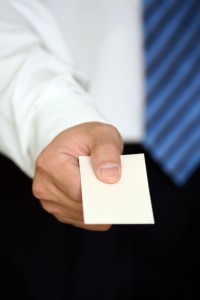There’s More to Business Cards Than Contact Info
Putting a rubber band around business cards you’ve collected is a start, but you’ll need to do more to build powerful relationships with the people you’ve met.
Get helpful contacts into your address book promptly and maximize your networking efforts.
 If you’re going to networking events, attending classes or seminars, or meeting other people, it is likely that you are exchanging business cards. But what do you do with them when you get back to your home or office? If you’re like most of the people who I work with, you probably put a rubber band around them and drop them into a drawer, never to think about them again.
If you’re going to networking events, attending classes or seminars, or meeting other people, it is likely that you are exchanging business cards. But what do you do with them when you get back to your home or office? If you’re like most of the people who I work with, you probably put a rubber band around them and drop them into a drawer, never to think about them again.
This is a waste of time on several levels. First, if you’re not taking action on those business cards, it wasn’t a helpful endeavor for you to go to those networking events or seminars in the first place. Second, it’s a waste of your time down the road when you have to sort and process through those cards, racking your brain trying to figure out who these different people are.
It’s important to have a strategy for dealing with business cards as soon as you collect them. When you return from a networking event, immediately go through the cards and decide which people you’d want to contact again and which ones you wouldn’t. For those who fall into the latter category, recycle their business cards immediately. For the others, transfer their contact information into your address book. In addition, however, be sure to copy other important details that will help you remember this person. You’ll thank yourself later.
- Note where and when you met them. Was it at a specific networking event, seminar, or trade show?
- Note down any key memory triggers. What did they wear? What did they look like? What conversation did you have with them? Did they tell you a funny detail or story that will help to connect with them later?
- Finally, note how you can help them or vice versa. Do they provide a valuable service that you can offer to your clients? Do you have something that you can offer them or the people they serve? Under what circumstances might you want to contact them again?
All of these bits and pieces of information help you build the relationships that are so important in the world of business. The more of this information you’ve captured in your address book, the more likely it is that you’ll be able to make your connection a valuable one.

Leave a Reply